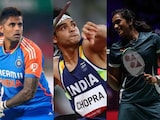Supporters of South Africa's ruling African National Congress arrive to attend the final ANC election campaign rally at Soccer City stadium in Johannesburg on May 4, 2014
AFP Image
Johannesburg:
The majority of the 24 million registered voters in South Africa are expected to head to polls tomorrow to elect a fifth democratic government since anti-apartheid icon Nelson Mandela first assumed power in 1994 after decades of white-minority rule.
The African National Congress (ANC) is largely expected to win the election again, returning its leader Mr.Jacob Zuma for a second presidential term, although analysts are expecting the party to have a smaller percentage than in the last elections in 2009.
Despite widespread dissatisfaction with Mr.Zuma's first term with allegations of corruption, mismanagement and sometimes violent protests about a lack of delivery on basic services, the ANC's dominance is expected to continue amid a highly fragmented opposition that has also seen former ANC Youth League leader Mr.Julius Malema taking on his bosses with his own Economic Freedom Fighters Party.
With rhetoric of increasing employment and services through nationalisation of assets, Mr.Malema has found favour among the youth and is expected to garner a number of seats in parliament. The strongest opposition though remains the Democratic Alliance, led by Helen Zille, which has been gaining ground among blacks after initially being seen as a whites' party.
The 2014 elections will be the first in which the so-called 'Born Frees' - people born after 1994 in a democratic South Africa - will be casting their votes. The South African system of proportional representation sees voters choosing parties rather than candidates, with the party winning a controlling number of seats in the legislature selecting the president.
Latest polls indicate that the ANC is likely to secure about 63 per cent of the poll, just under 3 per cent less than it got in 2009. This year's elections have also seen the Independent Electoral Commission (IEC), highly respected across the continent and internationally, come under fire for alleged involvement by its chairperson, Pansy Tlakula, in irregular property deals for IEC buildings.
Several parties went to court last week in an attempt to remove Tlakula from office, threatening to have the results declared null and void saying she would not be neutral as the IEC head. The court however ruled that Tlakula would continue in her position until the matter is heard after the elections. In the last hours before polling booths open at 7 am tomorrow, thousands of police and soldiers have been deployed to a number of hot spots across the country where violent protests have erupted largely because of dissatisfaction with service delivery.
Scores of protesters have been arrested for burning public property and blocking roads. Final results of the election are expected within a week.
The African National Congress (ANC) is largely expected to win the election again, returning its leader Mr.Jacob Zuma for a second presidential term, although analysts are expecting the party to have a smaller percentage than in the last elections in 2009.
Despite widespread dissatisfaction with Mr.Zuma's first term with allegations of corruption, mismanagement and sometimes violent protests about a lack of delivery on basic services, the ANC's dominance is expected to continue amid a highly fragmented opposition that has also seen former ANC Youth League leader Mr.Julius Malema taking on his bosses with his own Economic Freedom Fighters Party.
With rhetoric of increasing employment and services through nationalisation of assets, Mr.Malema has found favour among the youth and is expected to garner a number of seats in parliament. The strongest opposition though remains the Democratic Alliance, led by Helen Zille, which has been gaining ground among blacks after initially being seen as a whites' party.
The 2014 elections will be the first in which the so-called 'Born Frees' - people born after 1994 in a democratic South Africa - will be casting their votes. The South African system of proportional representation sees voters choosing parties rather than candidates, with the party winning a controlling number of seats in the legislature selecting the president.
Latest polls indicate that the ANC is likely to secure about 63 per cent of the poll, just under 3 per cent less than it got in 2009. This year's elections have also seen the Independent Electoral Commission (IEC), highly respected across the continent and internationally, come under fire for alleged involvement by its chairperson, Pansy Tlakula, in irregular property deals for IEC buildings.
Several parties went to court last week in an attempt to remove Tlakula from office, threatening to have the results declared null and void saying she would not be neutral as the IEC head. The court however ruled that Tlakula would continue in her position until the matter is heard after the elections. In the last hours before polling booths open at 7 am tomorrow, thousands of police and soldiers have been deployed to a number of hot spots across the country where violent protests have erupted largely because of dissatisfaction with service delivery.
Scores of protesters have been arrested for burning public property and blocking roads. Final results of the election are expected within a week.















